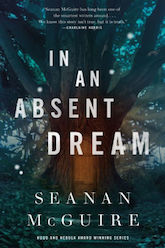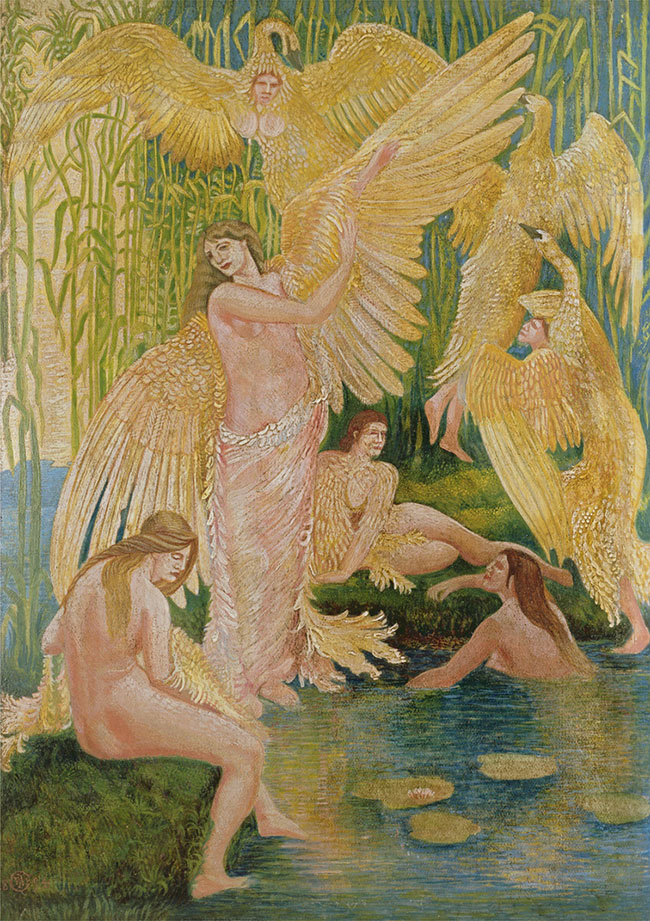Many tales of animal brides and grooms are tales of high romance and love. Others are tales of arranged marriages, carefully crafted to reassure audiences that yes, happiness and even love could be found in those situations—and that appearances could be deceptive. And still others are stories of outright terrible spouses, where using the word “animal” to describe the spouse is an insult to real animals everywhere.
The version of “The Swan Maidens” collected and retold by Australian folktale scholar Joseph Jacobs in his 1916 European Folk and Fairy Tales is most definitely in that terrible spouse category.
I say “retold” here in this particular case quite strongly, since Jacobs’ version is a compilation of various stories of swan maidens told throughout Europe. Jacobs was hardly alone in this—the Grimms virtually bragged that several of their stories were more or less put together from four or five different fairy tales, and the French salon fairy tale writers all built their stories from elements borrowed from multiple tales. In this, we can even say that if he failed as a recorder of oral traditions, in all other ways Jacobs was working in the very best fairy tale traditions.
He also had considerable material to work with. Stories of swan maidens stretch back to antiquity in Europe. Or, I should say, swan people. The most famous example is more a tale of a swan lord than of a swan maiden: the tale of Zeus seducing Leda in the form of a swan, which either sounds just slightly awkward or a good way for Leda to avoid an even more awkward situation: “Honey, I swear. He looked like a swan the entire time and I mean, yes, swans are beautiful but not god like beautiful I just thought I was petting a swan. A nice innocent swan. Really.”
But I digress.
The story of Zeus and Leda inspired several pieces of art, helping to keep the idea of seductive swans into the popular imagination. Though many later folktales did try to clarify the bestiality point: in those stories, the swan maidens were most certainly not in swan form when they embraced their lovers—or in many versions, were forcibly embraced by their lovers. Instead, they removed their swan skins, transforming into human maidens—another fairly common trope in folklore. The Zeus and Leda story also, I think, helped establish the idea that these swan maiden stories would present a more ambiguous take on marriage than what is typically associated with (if not always accurately associated with) fairy tales.
Jacobs’ version begins on a violent note, as a skilled hunter heads out to a lake to bring in some ducks. Instead of ducks, however, he finds seven swan maidens, who all remove their swan skins to go swimming in the lake. The hunter, deciding that the youngest is the prettiest, steals her swan dress. Without her feathers, she cannot fly, and can only watch her six sisters fly off without her. She begs the hunter to return her robe. He gives her his cloak instead, and, in Jacobs’ words, “made her promise to marry him.”
Also in Jacobs’ words:
So they were married and lived happily together….
Really, Jacobs? This swan maiden has just been forcibly separated from her sisters and forced to marry a man who shoots birds. Birds like her. I think it’s fairly probable that she knows very little about human housework—I mean, most swans don’t take cooking lessons. And to repeat the point, she was forced to marry this husband.
In a German version, the maiden comes willingly to the hunter after he steals her robe—the tale does not mention any forced promise of marriage. In a Romanian version, the maiden leaves her fairy home willingly enough, transforming into a maiden to avoid death. This willingness or at least acceptance is also a strong element of most tales featuring women sent to marry beasts and monsters. True, most are given a choice between that marriage and death, or that marriage and the destruction of their families, but they are usually given some sort of choice. For whatever reason, Jacobs discarded those versions, and stayed with the version where the swan maiden is forced into marriage.
Buy the Book


In An Absent Dream
They do have two children. One child finds the swan robe, quite by accident. The swan maiden immediately flies away, leaving her children behind. Again, I question just how happy this marriage was. It’s possible, of course, that she was simply pulled away by magic—this would hardly be the first or last time that a fairyland forced one of its denizens to abandon the mortal world. But I can’t help noticing that she takes the first chance she can to escape—and is so desperate to return, or so pulled away by her enchanted home, that she is even willing to leave her children behind.
To be fair, she does let the hunter know where she’s heading to. But that destination? The fabled, near impossible to reach land East of the Sun and West of the Moon. A place other fairy tale protagonists have reached—with, granted, magical assistance.
So the hunter sets out. (Without, I must note, arranging for child care for the two kids, like, what, being a terrible husband wasn’t enough? Now you need to add absentee fatherhood to this?) Thanks to some form of cursed luck—or perhaps, some fairy somewhere with a grudge against the swan maiden—he runs across an old man needing assistance. Said man turns out to be the King of the Beasts (sorry, lions everywhere) who sends him to the King of the Birds, who sends him to the King of the Fishes, who has him talk to a dolphin, WHO IS NOT A FISH (unless this is a reference to the dolphinfish, but since that’s not the word used in the text, I think not), who sends him to the Wild Forest, where the hunter proceeds to trick two men out of their magical objects. I’m genuinely beginning not to like this guy.
The magical items do get him to his destination, however, where he is able to identify his swan maiden out of the seven swan maidens in front of him, not through any shared memories or jokes, but by touching her fingers—one of which was frequently pricked by a needle when she was trying to sew clothes for her kids.
So, let’s sum up: the hunter kidnaps the swan maiden, separating her from her family; forces her to marry him; then forces her to sew for the kids—an activity she clearly did not need to do at home—abandons his kids, and steals magical items from otherwise innocent bystanders.
Also, despite his hunting background, he can’t tell the difference between a dolphin and a fish.
….yikes.
To be entirely fair, the King of the Fishes (or, more probably, Jacobs) apparently couldn’t tell the difference between dolphins and fish either—or felt that his reign would be limited unless he also controlled dolphins and whales. So we can handwave that. And to be entirely fair, the swan maiden does agree to return to the hunter. And I suppose, as children of a magical swan maiden, their children are not exactly defenseless—and quite possibly able to care for themselves quite well.
And since this story is often about a girl traveling for years to find her once-beastly husband, I rather like the inversion here of the husband needing to travel to find his wife. He’s hardly alone in this—the prince in “The Girl Without Hands” must also chase after his wife for years, as does the protagonist in the elaborate Italian fairy tale of Lionbruno, after he deeply offends his promised wife, the fairy Colina. Interestingly enough, in both these tales, characters first had to escape from the Devil, and then spend years separated from their spouses, or potential spouses, in Lionbruno’s case. The hunter never encounters the Devil at all. Though Lionbruno also uses the same trick used by the hunter in this swan maiden tale to steal gain magical items from quarreling men. So in that sense the two aren’t all that different. Indeed, it’s more than possible that Jacobs took his inspiration for that incident from Lionbruno’s tale.
But overall, I find myself twitching at this fairy tale, a tale not of rescue, or transformation, but rather one of pulling a woman down from the sky, of stealing magical items to pursue her and prevent her from leaving, to pull her away from her life once again.
It is another reminder that for all their happy endings, fairy tales more than merely touch on darkness: they often expose it. Many protagonists in fairy tales do escape. Others do not.
Mari Ness lives in central Florida.










